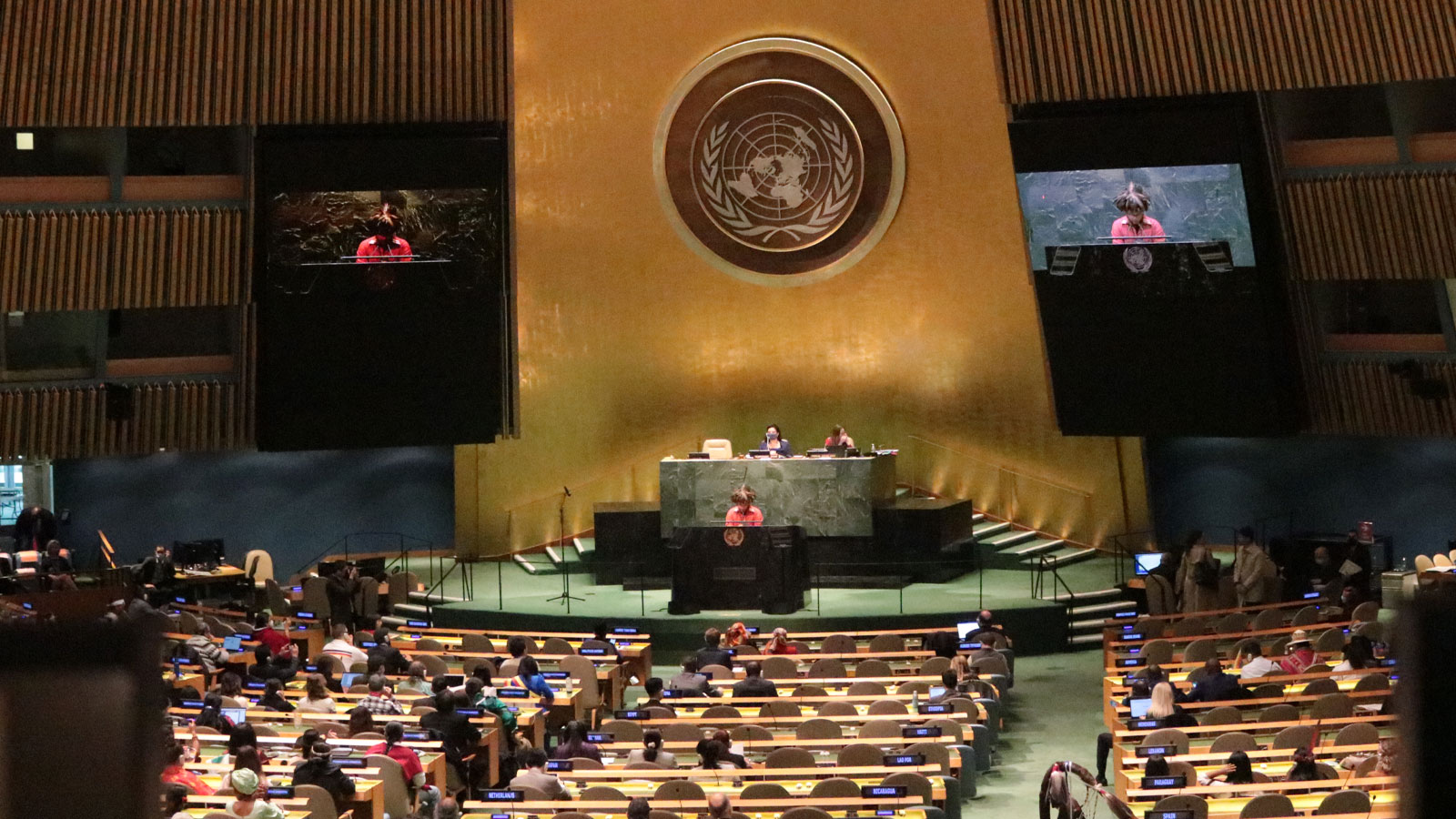This story is published as part of the Global Indigenous Affairs Desk, an Indigenous-led collaboration between Grist, Indian Country Today, High Country News. Native News Online also contributed to this article.
The United Nations Permanent Forum on Indigenous Issues, or UNPFII, concluded its 21st session on Friday, calling on governments, courts, and U.N. agencies to implement mechanisms to support and protect Indigenous peoples’ lands and lives. It also recommended that Indigenous peoples be given more opportunities to participate in the U.N.’s General Assembly process through “enhanced participation” – a move that could elevate the forum to a level on-par with member states.
The forum is one of the few official venues where Indigenous voices are reliably heard at the U.N., but its role is constricted by a structure that only allows UNPFII members to make recommendations to other U.N. bodies, like the the Economic and Social Council or UNESCO. Indigenous nations, communities, and peoples are classed as non-governmental organizations, and cannot vote or speak to U.N. bodies without an invitation, including the General Assembly.
“A basic, first step for enhanced participation would be the United Nations recognizing that tribes have a right to be here and have a right to be able to attend,” said Geoffrey Roth, a Standing Rock Sioux descendent and UNPFII member. With enhanced participation, Roth says, Indigenous peoples could engage directly, and equally, with member states to ensure rights are protected and concerns are heard.
“We need the support of the absolute leadership of the United Nations to address Indigenous human rights,” said Hannah McGlade, a Noongar woman and member of UNPFII from Australia. “We mustn’t lose sight of the changes that can come through our engagement, our advocacy, and our work with member states.”
Throughout the forum, Indigenous representatives and leaders from around the world highlighted their concerns and challenges around free, prior, and informed consent, or FPIC – a consultation process designed to protect the rights of Indigenous peoples when it comes to development. They also discussed how dangerous mining practices driving the green energy transition are threatening Indigenous peoples around the world, how harmful conservation practices are impacting traditional territories, and the need for urgent attention on violence against Indigenous land defenders and women.
In a draft report put forth by UNPFII leaders Friday, members urged countries to implement the United Nations Declaration on the Rights of Indigenous Peoples, including calling on the United States and Canada to develop national action plans to implement the agreement. Both countries have signed onto support UNDRIP after years of opposition, but have not generally moved to codify those international rights into their legal systems.
Under the forum’s proposals, relevant UN agencies, like the World Bank, the Food and Agriculture Organization, and UNESCO would initiate studies on the implementation of FPIC, the impacts of industrial fishing on Indigenous communities, and develop and align internal policies to protect human rights with regards to intellectual property rights and traditional knowledge. In the wake of the COVID-19 pandemic, the forum also recommended that the World Health Organization incorporate Indigenous cultures into the social determinants of health policy.
The forum also called on U.N. member states to immediately implement court rulings, specifically in Norway, where a supreme court decision in favor of the Sami people has yet to be enforced, and in Kenya, where the government has failed to execute recommendations from the African Commission on Human and Peoples Rights to return ancestral lands and provide restitution to the Endorois who were evicted in the 1970’s to create a wildlife reserve. It also called on the government of Tanzania to immediately stop the eviction of the Maasai people from the Ngorongoro Conservation Area.
“This is really a very challenging moment for the Permanent Forum, that continues to be a subsidiary body,” said Darío José Mejía Montalvo, the chair of the forum, in an interview. “We still don’t have enough of a voice in those bodies where the decisions are made at the United Nations and the states.”
Despite the challenges and limitations of UNPFII, Mejía Montalvo believes that it can help elevate the concerns of Indigenous peoples around the world and empower them to push for change in their countries. A sentiment echoed by Geoffrey Roth who hopes to put pressure on international bodies like the World Bank to start making change. Roth says that pressure could be stipulating that the World Bank has a process in place to ensure member states that receive funding have a strong FPIC policy. If they don’t, he says, the World Bank could refuse to work there. “The money is where the power is – and the World Bank is the pocket book,” he said.
Leaders say next year’s session will focus on global health and climate change.



